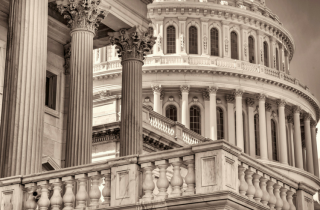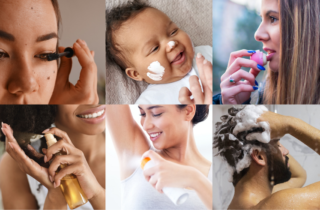Federal Bill Package Will Make Safer Beauty Available to All
This suite of federal safer beauty bills addresses gaps in cosmetic safety by banning the worst chemicals; requiring fragrance disclosure; protecting women of color and salon workers; and creating supply chain transparency.
FOR IMMEDIATE RELEASE
MAY 24, 2023
CONTACT:
Janet Nudelman, Breast Cancer Prevention Partners
Erika Wilhelm, Breast Cancer Prevention Partners
WASHINGTON, D.C.—A suite of four bills was introduced in Congress today to make beauty and personal care products safer for everyone by getting the toxic chemicals out, reducing hazardous chemical exposures for the most vulnerable, and making ingredient transparency the new industry standard.
The four bills cover almost every aspect of personal care product safety. They are:
- The Toxic-Free Beauty Act (Reps. Schakowsky and Fletcher): Bans 11 of the most toxic chemicals, including mercury, formaldehyde, parabens, phthalates, and phenylenediamines (hair dye chemicals). The European Union, California, and Maryland already ban these chemicals, yet they are in cosmetic products sold legally in the United States.
- Cosmetic Safety Protections for Communities of Color and Salon Workers (Reps. Schakowsky and Blunt Rochester): Funds research, resource materials, education and outreach, and the development of safer chemicals to protect the health of women of color and salon workers, two vulnerable populations who are among the most highly exposed to toxic chemicals because of the cosmetic products marketed to them or commonly found in their workplaces.
- Cosmetic Fragrance and Flavor Right to Know Act (Reps. Schakowsky and Matsui): Requires product label and website disclosure of these secret, unlabeled, and often toxic chemicals in our beauty and personal care products.
- Cosmetic Supply Chain Transparency Act (Rep. Schakowsky): requires suppliers of raw materials, ingredients, and private label products to provide full ingredient disclosure and safety data to cosmetic companies so they can make safer products.
“Safe, accessible beauty cannot wait. After more than 80 years of inaction, the United States finally updated its cosmetics laws last year. President Biden signed into law the Modernization of Cosmetics Regulation Act, which now gives authority to the Food and Drug Administration to recall beauty and personal care products that are harming human health. While this was an important first step, our work is not done,” said Congresswoman Jan Schakowsky. “I am proud to reintroduce the Safer Beauty Bill Package with my colleagues, Reps. Lizzie Fletcher, Doris Matsui, and Lisa Blunt Rochester, which would protect consumers from toxic chemicals linked to hormone disruption, cancer, and other health problems; require full ingredient transparency, including closing the fragrance and flavor loophole, for consumers and brand owners; and protect the health of women of color and salon workers, who are among the most highly exposed to toxic chemicals because of the products marketed to them or commonly found in their workplaces. We must pass the Safer Beauty Bill Package now!”
Most consumers do not realize that the beauty and personal care products they use daily might not be safe. Yet it’s perfectly legal for these products to contain hazardous ingredients. From cancer-causing asbestos in baby powder to hormone-disrupting phthalates in body wash to brain-damaging lead in lipstick, the situation is dangerous to the health of all. Breast cancer, learning disabilities, early puberty, and reproductive and developmental harm are all on the rise; hundreds of scientific studies show it’s due in part to our ongoing daily exposure to toxic chemicals lurking in our homes, workplaces, and our communities—including our beauty and personal care products.
“These long overdue bills will provide the FDA further insight into the health effects of personal care products marketed to Black consumers and bring to light more data needed to address these harms,” said Yuwa Vosper, Policy & Regulatory Manager for WE ACT for Environmental Justice. “Research has shown that Black women in the U.S. spend nine times more on hair and beauty products than non-Black women and many of those products contain harmful chemicals. This is even more concerning when we consider cumulative impacts, as people of color in the U.S. are already disproportionately exposed to outdoor pollution and environmental hazards. We support the Safer Beauty Bill Package, including the Toxic-Free Beauty Act and the Cosmetic Fragrance and Flavor Ingredient Right to Know Act.”
The U.S. lags behind the rest of the developed world in chemical safety. For example, the European Union bans nearly 1,800 chemicals from cosmetics, while the U.S. FDA still only bans or restricts 11. Also, companies can use virtually any raw material in a finished cosmetic product without FDA pre-market safety testing or review.
“Many people assume that the personal care and beauty items they use are safe, but with minimal oversight, many of the care, beauty, and salon products sold across the country actually contain toxic chemicals,” said Congresswoman Lizzie Fletcher. “I’m glad to partner with Congresswoman Schakowsky to reintroduce the Toxic-Free Beauty Act to protect the health and safety of people across the country by banning chemicals known to cause significant harm in beauty products.”
“The Safer Beauty Bill Package puts consumer and worker health first by banning the worst chemicals from cosmetics; requiring disclosure of the secret fragrance chemicals hiding in beauty products; closing gaps in cosmetic safety for communities of color and salon workers; and requiring supply chain transparency so companies can get the information they need to make safer products,” said Janet Nudelman, Director of BCPP’s Campaign for Safe Cosmetics. “Although Congress enacted sweeping federal cosmetic policy reform in December through the Modernization of Cosmetic Regulations Act (MoCRA), these key gaps in cosmetic safety remain. The Safer Beauty Bill Package is urgently needed to ensure everyone has access to safe cosmetics,” said Nudelman.
A Silent Spring Institute and Clearya study found that out of 7,300 cosmetic products examined, 38% had at least one ethoxylated ingredient—and, therefore, could contain the cancer-linked contaminant 1,4-dioxane. This cancer-causing chemical is just one of the contaminants addressed by the Cosmetic Supply Chain Transparency Bill, which would require suppliers to disclose harmful contaminants to cosmetic companies purchasing private-label products or raw materials. Brand owners need full ingredient disclosure and safety data from their upstream suppliers to make the safer products consumers want and deserve.
“We’ve all seen the headlines: Asbestos in baby powder; lead and other heavy metals in kids’ face paint; and benzene in sunscreen. Small and large cosmetic companies alike are at the mercy of a supply chain that lacks transparency and accountability for the safety of the ingredients, raw materials, and private-label products it provides to the $100B cosmetics industry. We as businesses can and must provide safer products to our customers for their health. It just makes good business and economic sense,” said David Levine, Co-founder & President of the American Sustainable Business Network.
“I am proud to co-lead the Cosmetic Safety Protections for Communities of Color and Salon Workers Act with Rep. Schakowsky as part of the Safer Beauty Bill Package,” said Congresswoman Blunt Rochester. “Bottom line, our bill will ensure meaningful protections for women of color and salon workers who are at greater risk for exposure to toxic chemicals from cosmetic products through increased risk awareness and the development of safer alternatives – helping us protect the health and safety of these and all communities.”
“Nail and hair salon professionals, who are mostly low-wage earners, immigrants, and women of color, are exposed daily to a toxic array of dangerous chemicals without their knowledge or consent,” said Catherine Porter with the California Healthy Nail Salon Collaborative. “The Cosmetic Safety Protections for Communities of Color and Salon Workers Bill will help ensure products are safer and more transparent for these two extremely at-risk, vulnerable populations.”
“I have been a manicurist for almost 30 years and have experienced breathing problems, dizziness, headaches, nausea, and eye irritation,” said Ivy Nguyen, a licensed manicurist. “It’s important for workers like me to know the ingredients that we are working with, so we know how to protect ourselves and choose safer nail products.”
“Our data speaks volumes about the urgency of the Safer Beauty Bill Package. In screening millions of product ingredient lists, Clearya has repeatedly found chemicals linked to cancer, reproductive toxicity, developmental harm, and hormone disruption present in everyday personal care products. This issue extends to all consumers, and more so to vulnerable populations such as Black women and girls, and salon workers, who can be disproportionately affected,” said Amit Rosner, Co-founder at Clearya. “The legislation introduced is a significant step towards rectifying these injustices. It’s not only about empowering individuals to make safer choices, but also about signaling to the industry that setting higher safety standards is both imperative and will be rewarded by a more informed, health-conscious consumer base.”
“Having fragrance ingredient information will give consumers the facts they need to make safer, more informed purchases. That is why I am proud to join Congresswoman Schakowsky in announcing the Cosmetic Fragrance and Flavor Ingredient Right to Know Act of 2023, which would ensure transparency and accountability from cosmetics manufacturers,” said Congresswoman Matsui. “This important bill would mirror California’s first-in-the-nation law, which empowers consumers to know what they’re putting in their bodies by requiring companies to disclose potentially harmful ingredients in cosmetic and personal care products.”
“Fragrances are prolific in beauty and personal care products, yet there is no state or federal regulatory oversight of these ingredients. In fact, the fragrance industry is virtually self-regulated, and the safety and transparency of fragrance chemicals are often left out of policies or practices designed to protect public health, even those fragrance chemicals linked to cancer, allergies, or reproductive and respiratory harm. As a result, nearly a third of the chemicals used to make scented products are considered toxic or potentially-toxic by scientists around the world,” said Amber Garcia, executive director at Women’s Voices for the Earth. “We need strong laws and corporate practices that unveil the extent to which hazardous chemicals are present in fragrances, and which prevent toxic chemicals from ending up in our cosmetics in the first place.”
“Safer products, with greater transparency as to what is in a product, allows for consumers to make an informed choice on the personal care products they use, but also what their loved ones use,” said Dr. Jasmine McDonald, Assistant Professor of epidemiology at Columbia University Mailman School of Public Health. “Early age of exposure and cumulative exposure to these chemicals can have serious health implications.”
“We support the new package of bills for safer beauty because the people most vulnerable to chemical exposure, especially women and people of color, need to know what is in the products they put on their bodies and their children, and that the most toxic chemicals are not in those products,” said Kayla Williams, Diversity, Equity & Inclusion Lead for Clean Production Action.
###
Breast Cancer Prevention Partners (BCPP) is the leading national organization working to eliminate toxic chemicals and other environmental exposures that lead to breast cancer. www.bcpp.org
BCPP’s Campaign for Safe Cosmetics leads the movement to make beauty and personal care products safer for all. www.safecosmetics.org
The American Sustainable Business Network advocates for policy change and informs business owners, policymakers, and the public about the need and opportunities for building a vibrant, sustainable economy. Through its national member network, it represents more than 250,000 businesses in a wide range of industries. www.asbnetwork.org
Founded in 2005, the California Healthy Nail Salon Collaborative is a statewide grassroots organization that addresses health, environmental, reproductive justice, and other social issues faced by its low-income, female, Vietnamese immigrant, and refugee workforce. www.cahealthynailsalons.org
Clean Production Action designs and delivers strategic solutions for green chemicals, sustainable materials, and environmentally preferable products. www.cleanproduction.org
Types: Press Release



